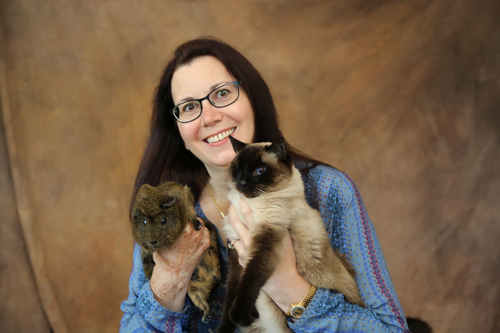Hormonal Management in Pet Birds
It’s springtime – well, at least it should be! Birds are singing and building their nests for the year. Just like our wild birds, the changing daylight and other signals can trigger our pet birds to believe it is the breeding season.
Why do we care? By far, the most common diseases we see in this practice involve reproductive abnormalities in our pet birds. Female birds who are laying eggs may suffer from high cholesterol, egg binding, egg yolk peritonitis, and even paralysis. Even a bird that is not actively laying eggs can have chronic issues relating to hormones including liver disease, blood clots, strokes, heart attacks, feather destructive behavior, and behavioral changes such as aggression or screaming. Some of these conditions can affect both males and females.
We can manage our birds’ environments to help reduce the risk of hormonal stimulation with a combination of steps:
1) Eliminate perceived mates: Is your bird preening your beard? Is she regurgitating to the reflection in the mirror? Does he regurgitate every time you walk in the room? Birds in the wild only sit with or cuddle with those individuals who are mates. If allowed to cuddle, sit on our shoulders, or be petted frequently, our pet birds begin to think of the humans in the household as ‘mates’. Other birds, mirrored reflections, and even toys can also serve as mates. The presence of a ‘mate’ causes them to have an increase in reproductive hormones. As difficult as it is, it is important to restructure how we handle our birds. Talking, teaching tricks, and playing flying or laddering games are much healthier ways for us to interact with our birds than cuddling. This is quite different than how we would interact with our dogs and cats in the household. In addition, it is important to remove access to toys or mirrors that may be stimulating to your bird.
2) Perceived nest boxes: If a bird perceives a nesting area or nesting cavity, this will cause the reproductive hormones to increase. This may include crawling under a towel, under your hands, into a corner of the cage, or even under a newspaper. You should remove any huts or tents from your bird’s cage, place a grate at the bottom of the cage, and make sure that he or she is supervised when out of the cage. They love doing a walkabout in search of a good nesting cavity!
3) Nesting material: If your bird is allowed to chew obsessively, it may mimic nest-building and trigger additional hormonal behavior. It is important to eliminate paper, chew toys, or anything else that your bird may obsessively chew on from the cage. For some birds, this is seasonal – certain toys need to be removed during the ‘breedy’ season, but are not a problem during other times of the year. Keep in mind that it is still important to offer environmental enrichment for your bird – foraging opportunities are excellent and safe ways to do this.
4) Limit abundant food: In the wild, birds only breed during the breeding season when food is abundant. In our houses, we are often feeding our birds abundant food. Start getting in the habit of meal feeding your bird. Offer the fresh food for 30-60 minutes, then remove it from the cage. You can leave the pellets in the cage all day. It is also very important to avoid any soft moist foods such as oatmeal, wet cereal, mashed potatoes, or baby food – these can be a reproductive trigger for many birds as they think you are offering regurgitated food to them (i.e. ‘feeding’ them).
5) Light: Light plays an important role in regulating hormones. Unfortunately, it is difficult to sufficiently control light in our home environment. It may be beneficial to provide 12 hours of light and 12 hours of dark to your bird. If you do not already have this arrangement, consider setting up a sleeping room for your bird. It should be located in a quiet part of the house, and the room should have a door and shades on the window so that it can be adequately darkened.
If these strategies do not work, we can consider pharmaceutical intervention. We have two options for birds to reduce reproductive hormones:
1) Lupron (leuprolide acetate): This is a hormone injection that down-regulates the reproductive cascade. It generally lasts 12-16 weeks.
2) Suprelorin (deslorelin): This medication exists in an implant form. Your bird is anesthetized briefly and the implant is injected beneath the skin. For some birds, the implant will provide management of hormones for nearly 12 months; for others, that time period is much shorter.
If your bird is beginning to exhibit hormonal behavior (i.e. regurgitation, rubbing his or her tail on the perch, seeking nesting areas, obsessively chewing nesting material, pulling out feathers), it is important to begin altering the environment to curb the cues that he or she is receiving. If you have any questions, please do not hesitate to reach out to us at (651) 645-2808 or group@stfrancisabh.com.
Employee Spotlight: Patricia Novak, DVM, CHPV
Dr. Patricia Novak received her Doctorate of Veterinary Medicine (DVM) degree from the University of Minnesota College of Veterinary Medicine in 1997. She worked at Life Care Animal Hospital in St Paul for over 12 years before joining St. Francis Animal Hospital in 2009. In 2018, she completed her certification through the International Association of Hospice & Palliative Care to become one of the first veterinarians certified in Hospice & Palliative Care.
Patti’s professional interests include hospice care, palliative care and behavior. She is a member of the International Association of Animal Hospice and Palliative Care (IAAHPC), Minnesota Veterinary Medical Association (MVMA), American Veterinary Medical Association (AVMA), American Association of Feline Practitioners (AAFP), and the Association of Exotic Mammal Veterinarians (AEMV).
She shares her home with her husband, Dr. Ralph Weichselbaum, and two children, Kipling and Anton. They participate in the foreign exchange program by hosting international high school students during the school year.
The family shares their home with 3 cats, Luna, Silver, and Conan; 1 guinea pig, Rue; and 1 cockatiel, Lucy. Dr. Novak volunteers at her children’s schools, teaches Sunday school, and is on the Church Council at the ELCA Lutheran Church. In her spare time, she enjoys hiking, visiting Duluth, reading, swimming in the ocean, and traveling.
Why do you love being a veterinarian?
I always knew I wanted to become a veterinarian. I love the challenging aspect of solving both medical and behavioral problems. I especially enjoy talking with clients to learn the valuable information needed to help solve their pet’s problem. In addition, helping families build stronger bonds with their pets is such a joy and so rewarding for me. Veterinary medicine allows me to develop and utilize various skills — performing surgery and dentistry, providing medical treatments, educating clients, and interacting with animals are only a portion of what we accomplish each day.

Why do you love working at St. Francis Animal Hospital?
I love working at St Francis because I get to work with such an amazing team. Everyone shows an abundance of compassion for our patients, our clients, and each other. In addition, St Francis feels like a neighborhood practice. I love getting to know our clients and their families and love to be able to use my skills to help them in their time of need.
While I enjoy the happy times, I am thankful when I am there to support and help families during the difficult times as well. Helping pets in their senior years or when their physical abilities decline can be a challenge, but there are many things that we can do to improve their quality of life during this stage. Saying goodbye to our pets is also difficult, but I enjoy helping our pet owners navigate these tough moments as well. It has been quite fulfilling to become certified in Hospice & Palliative Care and I am extremely excited to expand these services at St Francis.
Dr. Novak will celebrate her 10th Anniversary at St. Francis Animal Hospital in October. Thank you for all that you do!
Medication Refills and Online Appointments
We know how frustrating it can be to call St Francis during our spring busy season. Our schedule is often over-booked during this time of the year, accommodating all of our routine annual wellness visits as well as the unexpected emergencies that require care.
We wanted to provide you with a few tips that may help save you time, money — and hopefully some frustrations.
Refills: Each time you fill a medication at any pharmacy, there is a dispensing fee embedded into the costs. For most medications, we can fill a 90-day supply, just like at your own pharmacy. Filling a 90-day supply will save you time as well as repeat dispensing fees. Often, there are price breaks at larger quantities as well. Ask us about 90-day refills!
Please note that we have restrictions for refills on certain medications and 90-day refills may not be allowed on all medications.
In addition, we are legally required to maintain an active veterinarian-client-patient relationship. This means that we must have examined a patient within the past 12 months before we can dispense or prescribe medications or prescription foods. If your pet has not been in within 12 months to see a veterinarian, we will need to schedule a visit.
Please call, email, or request your online medication refills at least 24 hours in advance. That will allow us to obtain the proper authorization, if needed, and have it ready for you at the front desk.
With all refill requests, please leave the name of the medication, the dosage you are actually giving, and an update on how your pet is doing on the medication. For special order items or herbal formulations, please allow up to 7 days for your medication(s).
Website: If you haven’t visited our website, we encourage you to do so by clicking here. You may request an appointment or a refill by using the buttons on our home page. There are also great resources throughout our website on a variety of topics.
We welcome any additional feedback or suggestions that you may have for us. We are continuously evolving and improving to provide you with the best possible veterinary experience.
News Briefs
Volunteerism
Dr. Katie Cartledge recently provided volunteer services for Red Lake Rosie’s Rescue, while Dr. Roeser just returned from outreach work in Kentucky with Safe Hands Rescue. Thank you to both doctors for their service to our pet community.
Awareness Month
April was Heartworm Awareness Month and May is Lyme Disease Awareness Month. Please take this opportunity to make sure that your loved ones are protected from these serious disease conditions.
Favorite Animal Hospital
Thank you again for voting for us for Favorite Animal Hospital in Minnesota Women’s Press Magazine’s What Women Want 2019. To access the May issue with all of the chosen favorites, please click here.

